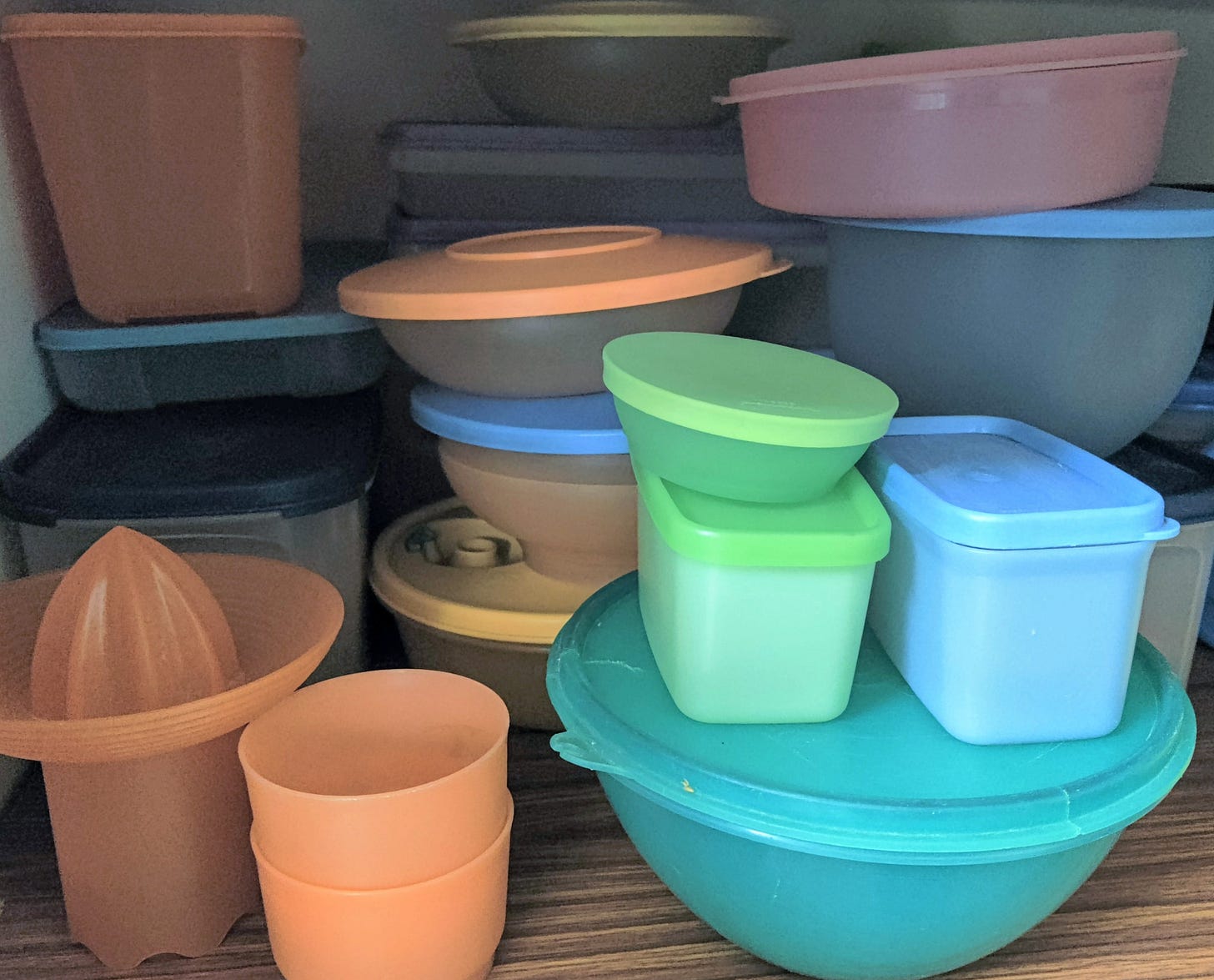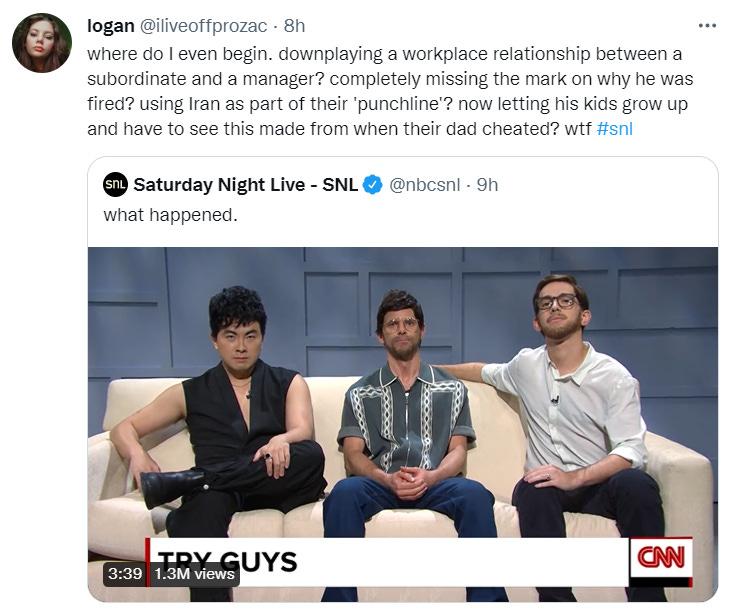Plastics, pyramids and accidental feminism: the Tupperware Story
It’s 2010. Neighbour aunty has just dropped off eid ki kheer in an orange matte-finish round dabba with a bright orange lid. Papa and the kids are excitedly hovering over the sweet treat… but a dark cloud looms over mumma. She will now have to cook something nice to put into this orange dabba and send it back ASAP. For the one thing we’ve all learnt growing up about dabba etiquette is that it *needs* to come back home immediately, or someone’s toast.
If you grew up with financially conservative parents like mine who only make exceptions for expensive “exclusive” items, you know the charm and pride a complete Tupperware set brings to the family. Our first indulgence was a dark blue casserole and tiffin set with red lids, which was displayed in a glass cupboard alongside Borosil and randomised beer mugs from the army mess. That grew multifold into an empire of sturdy colourful plastics of all shades and sizes — all with lids that fell behind kitchen counters straight into the abyss.

The Tupperware craze came about as quietly as a burst tyre. Mumma, maasi, maami and their friends discovered these stylish dabbas through a Tupperware Party an acquaintance had thrown in the society. The host, a sharp young housewife, had spread out the latest dabba collection she’d received from the company alongside hot samosas, jalebis and chai. She stood behind the table, facing a teeming living room, and ran everyone through the dreamy world of Tupperware’s almost illegal business model.
You sign up to be a Tupperware Lady, which involves a small fee. You push (or manipulate) your friends into buying dabbas via your reference code and get rewarded for it. Rewards include free dabbas, promotion in the ranks, and literal hard cash. You throw parties to sell products or take the show on the road; convert more ordinary women into Tupperware Ladies and you get even more hard cash. TBH, that sounds fucking awesome.
My sweet family women, alongside many other samosa consumers that day, found in Tupperware not only a really good quality product, but also an opportunity to girlboss. It was an easy way to make money (almost too easy), and the thrill of a company personally asking them to sell products on its behalf was too exciting to pass. Sparkly eyed and easily impressionable, these women marched right into the heart of India’s most beloved pyramid scheme, hitting door after door with sales brochures and turning every aunty in their wake into one of them.
I, proud first heir of a hundred plastic dabbas, believe that Tupperware makes for one of the most interesting and endearing brand stories of our times. While clearly a shady business model that took advantage of unsuspecting middle class Indian women for years, it also heralded a new era for the stay-at-home mom. An era of enterprise and agency.
What’s so shady?
A pyramid scheme is any business model that hinges on a multi-layered network of subscribers who are asked to rope in more subscribers in exchange for rewards or commissions. A white example of this is affiliate marketing, which is those “use code DISHA10 to get 10% off” posts influencers make (and get paid for everytime you use the code). A black example of this is… Laxmi Chit Fund, probably. Often in this pyramid, subscribers pay a periodic fee or have to be routine customers themselves.
For the most part, pyramid schemes are illegal in India. There are laws (lawyers can click here and here) criminalising any sort of money circulation schemes, which includes a scheme of paying rewards to subscribers out of money collected, err, from those very subscribers (that’s how most of these rewards or commissions work!)
So is Tupperware a pyramid scheme?
Well, yes and no. While I use the term loosely for theatrics, Tupperware the brand is not entirely an illegal business. In India, as in other South Asian countries, it once deployed pyramid tactics to secure a larger market — i.e. until that was made illegal. In India that surprisingly happened as late as December 2021.
Plus, running a pyramid scheme does not make the whole brand illegal — it just forces the brand to shut down that wing of operation. It can continue existing as a company and do, you know, non-shady shit for a change. Exceptions of course include brands like QNet that exist solely as pyramid schemes: then the state will shut that shit down completely.
Tupperware also now sells products the non-manipulative way, on e-retail sites. It’s always been party to the Indian Direct Selling Association of India — a self regulating group of door-to-door brands — alongside other mumma’s faves like Amway, Avon and Oriflame. Its throws with the law made Tupperware cheaper too, otherwise it’s exorbitantly priced for what it is (which is colourful plastic dabbas). I mean… mumma had bought a small flour container for about 1000/- bucks, which back in the day was steep pricing for many a desi household. It’s now on Amazon for like 650/-, huh.
Accidental feminism
To be fair, pyramid names like Tupperware, Amway, Avon or Oriflame rapidly found their way on our shelves because our moms saw in them a unique kind of independence. Moms were asked for. They were requested to be sales executives. They were told they could become kickass girlbosses, bring home some extra cash, get trendy kitchen goodies AND throw samosa parties for the girls as part of the job. What’s not to like?
This conversation with Asha Gupta, Tupperware’s first woman managing director overseeing Asia-Pacific wide dabbas, makes for an illuminating read. She says, when asked about how in the hell they made a pyramid scheme this size work, that their biggest challenge was not legality — but “to make women understand they could actually do this”. Their clientele in this timeline was predominantly housewives who did not hold paying jobs since getting married off, or ever. They *had to* spin empowerment into their business narrative, to get ordinary women to believe in themselves enough to be making money… for themselves but mostly for Tupperware. And that’s very impressive.
My favourite fact about Tupperware is that a mere 5% of its global sales taskforce is male. That is, only 5 out of 100 “employees” at this company are men. I know you can do the math yourself but I wanted to repeat this absolutely beautiful stat to instill some hope in this world. There *are* avenues out there, though barely legal, for women to earn money safely. There *are* corporate structures that end up empowering us, even if it is to commit crimes. It’s very little, but I’ll take it. I’ll take shady pyramid schemes run by Cleopatras anyday over clean businesses run by old, bald men.
So thank you, Tupperware.
Update Corner
Last week, we looked at the topical Try Guys cheating scandal performed by one Ned Fulmer. Quick update on that mess: the other three Guys swiftly removed Ned from the company (from the production company as well as castlist) due to the egregious workplace violation he committed with a subordinate. They then released an explanatory video, where their anger and sadness with the affair (ahem) was palpable; the video was nuanced — and for a change a group of men had actually held a male friend accountable for his predatory actions. The video has amassed close to 10 million views. It came out five days ago.
All was going fine, until SNL decided to weigh in. They put out this newsroom skit parodying the drama — but not the mess surrounding Wife Guy-isms and boss sleeping with employee — instead, they chose to laugh at the explanation video. Now the internet is angry at SNL, and for good reason. Here are three men doing the absolute most to chastise a colleague (and friend of ten years) who crossed many professional lines and put their company *and* a female subordinate in grave peril. And instead of finally rewarding this dignified response, SNL turns it into a joke.
Someone was right in pointing out that SNL is obviously making light of workplace predations — its replete with accounts of harassment and sexist misconduct at its core! Well, I personally defend SNL skits to an embarrassing degree IRL but this one made me puke in my mouth and delete my “SNL kissing family paul rudd” search history very fast. Bad move, babes.
Quickie 1: Ye kya hai?
Kanye West has outed himself as a white supremacist many times with his MAGA merch and antisemitic tweet, but this week’s online activity unveiled another quality of the multi-faceted music jeen-yuhs— his misogyny.
Earlier this week, Kanye posted this pic with problematic “activist” Candace Owens from his Yeezy show (where he also sent a model down the runway in this tee). This and all that I’m outlining below has been erased from his instagram: such is the nature of Ye’s volatile online presence.
So, he posted this. People lost their shit, rightfully, for this was a black man of power and prestige shitting directly on a very significant cultural movement empowering his people. One of the many (many) celebs to call him out was an invitee to this show —Vogue editor Gabriella Karefa-Johnson, who said that the tee was incredibly irresponsible and dangerous. Even though Ye believes WLM symbolises how white people will become a weak minority in the future, she said it actually feeds into violent rhetorics of supremacist groups who fear such a future and makes them more hostile towards minorities. No lies here.
What next, Kanye went on a rampage against Gabriella, calling her incompetent, dumb, unfashionable, etc. All of that is documented here. He literally made posts about her style and eluded to her being unfit for her post at Vogue. When the likes of Gigi Hadid and Hailey Bieber defended Gabriella, he went after them too. He signed up for talk shows big and small, to slander women who were… you know, right.
Kanye West sucks. We know that. But he has a specific (and now clear) pattern of going after women — be it his ex-wife Kim Kardashian, who he stalked, humiliated and endangered many times, or strangers who dare speak against him. Point to note is that a number of powerful men also spoke ill of his WLM tees but he chose to chase after Vogue’s first black woman editor and quickly made the discussion about her competence. That’s some beautiful dark twisted misogyny in full display.
Quickie 2: In the Pitts of Hell
This is an easy one to cover. Brad Pitt had sued Angelina Jolie earlier this year for selling a wine mansion they co-own without his permission. It emerged that she chose not to tell him because he served her with an NDA about… well, about having hit her and her kids. Jolie then filed a countersuit outlining the details of the abuse, claiming he has choked and struck two of their children. Details are here.
Brad Pitt is a pitiful father, and we’ve known that for a while. There are countless reports of him not giving a fuck about his children. The countersuit is yet to progress, but we know one thing for sure: fuck this guy. We believe Jolie, but unfortunately this might take the scary course of Depp-Heard trials. Overall, well and truly fuck this guy.
D-recs corner
Hello! Here are this week’s recs. I’ll keep it short since it’s been a looooong read today.
This week I watched…
Do Revenge on Netflix! This one’s a corny chickflick that knows it’s corny. With that girl from Riverdale and that girl from Stranger Things and a lot of other girls from a lot of other shows, this multi-starrer will keep you thoroughly entertained. And what the fuck are those outfits I want them *all*!!
If you’re in the mood for gameshows, Howie Mandel starrer Bullshit on Netflix is a great timepass. It’s kind of like an American WILTY where people are encouraged to lie well or tell the truth poorly, and it almost always makes for great television. Oh and if you don’t know what a WILTY is, stop reading and watch the funniest show to exist NOW! Most episodes are on YouTube (linked above). I also must shout out Pointless on YouTube, a show for hardcore competitive nerds and/or Alexander Armstrong fans (you come for one, stay for the other).
Weekly rave
So it’s 3 AM and you’re still awake. That can only mean two things: I’m either referencing the start of Taylor Swift’s I Bet You Think About Me or you have a fucked up sleep cycle. If soothing music is something that might cradle you to sleep, try the playstore app called Nightwave Plaza. It’s a brilliantly curated retro-feeling music player that plays an infinite loop of ethereal music as long as you want it to (it has a timer!) The current app version comes with live anime backgrounds too. It’s adequately customisable without making you put in too much effort: you’re trying to snooze after all. I also use it for studying/working sometimes.
Oh also — it’s October. Artists around us are attempting Inktobers of sorts which makes me want to excitedly refresh my socials every five minutes. But I’m absolutely gobsmacked by one particular rendition: Pranav Joshi’s month-long attempt to cook food inspired by daily Inktober prompts. So far his instagram page features tropical creme brulees, decadent Victorian sponges and a polarising pizza among other rave-worthy recipes. Give him a follow at @floydiancookery to see for yourself!
Tune therapy
It’s fall (or autumn, for us desis) which is all the excuse I need to share the saddest music I have on my person. This playlist is called sad, sad girls and there’s over 9 hours of mellow melancholy on here. Get your shawls and blankies out quick, we’re crying till diwali at the least!
Once we’re done being sad (which is in like 3.5 minutes), here's a show that’s sure to make you giggle. Beloved comedians James Acaster and Ed Gamble have an incredible podcast together — Off Menu — where they bring on small celebs and ask them to design their dream menu. Replete with funny food anecdotes and wacky dish choices, this is my top go-to show of all time! My favourite episodes: one featuring Kumail Nanjiani and the most recent one with Richard Ayoade.
Can I trust you with a book?
If you know of food legend Anthony Bourdain, chances are you’ve heard of his power-packed autobiography Kitchen Confidential. I love this book — for one, it brought me out of a reading slump, and two, it changed the way I see (and eat) food. So even if you find the subject tiresome, the book is worth a read or a thousand.
But that’s not the scoop. Charles Leerhsen is coming out with a new book titled Down and Out in Paradise: The Life of Anthony Bourdain on Tuesday, October 11. It’s a highly anticipated and salacious biography on his life. NYT describes it as the most gritting retelling of the celebrity chef’s turbulent life yet (out of many lukewarm ones). I’m excited to get my hands on a free version (no one’s paying 2k for a copy until they start selling in India) and write a review here. But don’t wait up — get yourself a copy too!
And that’s the week’s charcha!
You’ve reached the end of edition two of Charcha Weekly! As a thank-you-for-reading present, here’s a little research trick: everytime you hit a paywall on articles, use the prefix ( 12ft.io ) before your web address and hit refresh. Voila, no paywall. Now go have a cracking week, see you next Sunday!









A beautiful post, so good!
Didn't reach the end of the newsletter but can't wait to say that 'the' Tupperware part is whip-smart!